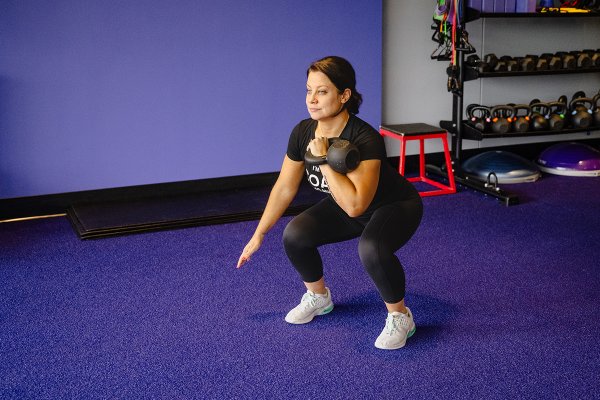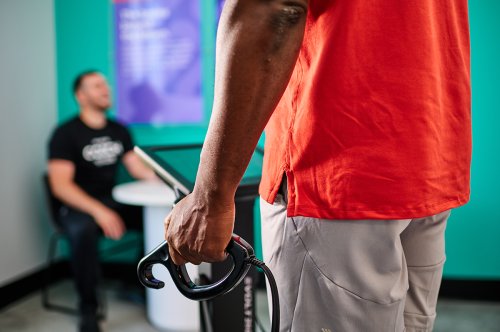You’ve been working really hard at the gym and trying your best to stick to a healthy diet (you go, you!). But when you step on the scale, you see a higher number than you expected.
Take a breath. Don’t panic. It is completely normal — and healthy — to experience weight gain after exercise.
5 reasons you’re experiencing weight gain after exercise
Experiencing weight gain while working out is actually pretty common, so know you’re not alone. It’s not because you’re working out “wrong.” In fact, initial weight gain could show that you’re working out right! Let’s break it down.
1. You’re new to working out
Our bodies are incredible machines and when you introduce them to something new — like exercise or dietary changes — they need time to recalibrate and make adjustments. Depending on the person, it can take weeks for your body to respond. Let your body balance out changes in muscle mass, water retention, calorie intake, and metabolism rate, and you’ll start to see results toward your healthy weight goal. Keep at it and allow your body time to process the change.
2. Exercising causes microtears and water retention

When you initially start exercising, your body will naturally go through many changes in the first few months. New exercises can lead to inflammation or microtears in your muscle fibers as you build muscle mass. This might sound scary, but we promise it’s good news.
Microtears are exactly what they sound like — small tears in your muscle fibers. If you’re engaging in an exercise program that involves strength training, weight training, or resistance training, you’re putting your muscle tissue under stress. Each time you lift a little heavier, or add an additional rep, you’re challenging those muscles and causing them to break down. This stress leads to microtears, which are repaired by your muscle cells. This repair process is what helps you build muscle mass and strength.
Muscle weight gain is obviously a good thing, but your body will respond to this inflammation by temporarily retaining water, which can lead to increased water weight. And that’s OK! Let your body heal. Drink plenty of water, eat well, keep an eye on your sodium intake, and get enough sleep.
Water weight is temporary, and it goes away with time. (If you menstruate, your cycle can also lead to fluid retention.) Be patient and don’t worry too much about the scale. Water weight means that your body is repairing, and your body composition will return to normal soon.
Glycogen conversion and exercise
Your body provides energy to your muscles by converting glycogen, or sugar, into glucose. When you begin exercising regularly, your body stores more glycogen to fuel the extra movement. Glycogen has to bind with water in order to fuel your muscles. As exercise becomes more routine over time, your muscles will become more efficient and need less glycogen to maintain your energy. As that happens, your muscles will retain less water and you will see that added weight come off!
3. Muscle weighs more than body fat

If you’ve only ever done cardio exercise, you may be confused when a strength-training program leads to weight gain. But the reason for it is simple: Weight training builds lean muscle mass, which is denser than body fat.
A pound of lean muscle mass and a pound of body fat tissue might weigh the same, but they take up different amounts of space. This means that muscle and fat may look the same on the scale, but they’ll look different on your body. While your clothes may feel looser, the scale may tell you otherwise. Count this as a win. You’re working a well-rounded program that includes both strength training and conditioning, and now you’re reaping the reward.
A pound of muscle also burns more calories than a pound of body fat, so muscle mass is really the gift that just keeps on giving, especially when it comes to weight loss goals. When you start working out on a regular basis — and building more muscle — your body burns more calories. In fact, weightlifters often set weight-gain goals and seek out weight-gain exercises because they know their body burns more calories from that type of workout routine.
4. Your appetite and diet are changing

You can’t out-exercise a poor diet, and a common reason people struggle to achieve weight loss is eating too much due to post-workout hunger. In order to shed the pounds, you must have a caloric deficit. It can be difficult to keep track of everything you eat, but try logging your meals once a week to check in on how much you’re actually eating (and drinking — sneaky extra calories hide in lots of beverages!). If you’re taking in more calories than you’re working off, you won’t see the weight loss you’re working toward.
For those who are starting a weight-loss journey, you might actually feel hungrier on workout days or the day after.
If that’s the case, don’t try and shave off too many calories from your diet. It won’t help, and it’s not sustainable or healthy. While fewer calories are key to losing weight, it’s just as — if not more — important to properly fuel your body for exercise. Cut back on extra calories from sweets and snacks, but be conscious of how much protein, healthy fats, and carbohydrates you need for productive workouts.
Small adjustments to your food intake can make a big difference. Try swapping:
- Red meat for lean chicken, eggs, seafood, beans, and more
- Ice cream for frozen fruit
- Saturated fats for healthy fats, like avocado and nuts
- Processed foods like fast food for more whole foods
Quick tips: Shopping the outer section of the grocery store and watching your portion sizes are great places to start. And remember, a healthy diet benefits every part of your overall health, from your digestive tract to your body weight to building muscle. It’s not all about weight loss — it’s about being the healthiest you can be.
5. You’re experiencing other health issues
While this is a less likely explanation than the others, it is possible that your unexpected or sudden weight gain is being caused by underlying health issues or medical conditions.
- Insulin resistance: Working out requires fuel, and while you might be focused on how much protein you’re eating, it’s actually glucose that immediately fuels your muscles for a workout. When your body doesn’t respond well to insulin, it’s known as insulin resistance. A variety of factors can cause insulin resistance, including thyroid gland issues.
- Thyroid issues: Thyroid issues are a common cause of unexplained weight gain, and an estimated 20 million people in the U.S. have some form of thyroid disease. Your thyroid gland (located at the base of your neck) releases hormones that control metabolism — aka, the way your body uses energy. An underactive thyroid can lead to sudden weight gain, because if your body isn’t receiving enough of those regulating thyroid hormones, it stores more weight.
While exercise can improve or mitigate many health conditions, exercise alone can’t treat thyroid issues. If you feel that thyroid issues might be contributing to weight gain, we suggest speaking with a health professional.
How to stay motivated when the number on the scale goes up
Weight loss is not a linear process and you aren’t going to see immediate results, no matter how much work you put in. If you didn’t gain 30 pounds overnight, you can’t expect to lose it that quickly, either.
Measure progress off the scale

Gaining weight is much more complicated than it seems, and the scale doesn’t always give you all the information you need — especially in the short term when rapid weight gain can seem like a problem.
Using devices like heart rate monitors and the Evolt 360 body scanner can be a great way to define progress, even if there’s a higher number on the scale. You can track your muscle mass growth, body fat mass, and tons of other measurements that are just as — if not more — important than weight.
Find helpful ways to stay on track
While many of us approach our fitness or weight-loss goals with a sense of confidence and a simple plan — eat less and workout more — almost everyone who’s tried that can attest to running into roadblocks. And that’s OK! Just make sure you’re prepared and have a plan of action. Check out these 10 Ways to Stay on Track with Your Fitness Goals — there’s bound to be something that will work for your unique journey.
Finding an accountability buddy is also a good bet. Enlist a gym buddy or set up regular sessions with a friend. Personal trainers can also provide support inside and outside the gym, helping keep you accountable so you can achieve your goals.
A final word on weight gain after exercise
If you’ve started or restarted exercising, you’re already making huge progress. Instead of focusing on how much weight you’ve gained or lost, ask yourself this:
- Am I craving less junk food?
- Do I have more energy?
- Is my sleep better?
- Have I moved beyond body weight workouts and started using weights?
After all, how much you weigh is not nearly as critical as how great you feel in and outside of the gym.
Whether you’re just getting started or trying to level up your fitness routine, finding what works best for your body is so much easier with the insights that come from a fitness consultation. Find the gym nearest you for a free consultation with a personal trainer to get a clear and personalized plan for success — whatever that means to you.


